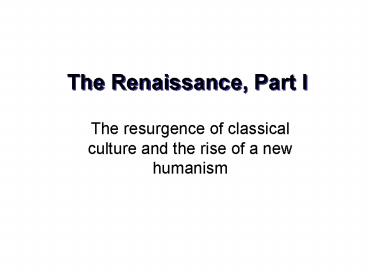The Renaissance, Part I - PowerPoint PPT Presentation
1 / 32
Title: The Renaissance, Part I
1
The Renaissance, Part I
- The resurgence of classical culture and the rise
of a new humanism
2
Florence, ItalyWhere the Renaissance begins
3
Why was Florence important in the 14th century?
- Florentine representative government
- Arti, senior guilds
- Center of wool trade
- Banking, banking families
- Stable monetary system
- For a century, the Medici family is a patron of
the arts, supporting such luminaries as
Donatello, Botticelli, Leonardo da Vinci, and
Michelangelo - Revolutionary Florentine art
- Renaissance
4
The Medici EraCosimo de Medici (1434-1464)
- Collected ancient manuscripts
- Patron of arts to atone for usury
- Fostered study of Greek language, philosophy
- Founded a new Platonic Academy
- Search for truth and beauty
- Sponsored the priest Marsilio Ficino, who fused
Platonism and Christianity - Platonic Love, Christian Platonism
- Known as Pater Patriae
- Patron of the arts
- Grandson Lorenzo funded rebuilding University of
Pisa, from which Greek texts were exported to the
rest of Europe
5
Medieval Art
10th Century Russian Icon (left) and 14th Century
Florentine Passion (right)
6
Medieval Art in the International Style Note the
bright colors, crowded composition, and rounded
figures No single-point perspective
7
Masaccios Holy Trinity
8
- a concern with, and technical ability to handle,
space and volume in a believable way - studious approach to model art from that of
ancient Rome - departure from more ethereal mode of medieval
otherworldliness to a greater concern for human
realism - This is achieved through
- clarity of line
- mathematically precise perspective
- close observation of real people
- concern for psychological states
- uncluttered arrangementsartist doesnt fill up
all available space
9
(No Transcript)
10
(No Transcript)
11
(No Transcript)
12
Florence Cathedralcombines Gothic buttressing
with Roman dome
13
Brunelleschis Foundling Hospital, How is this
different from Gothic style?
14
Brunelleschis Pazzi Chapel note the
similarities to Romes domed pantheon
Brunelleschis Renaissance Pazzi Chapel
Ancient Romes Pantheon
15
(No Transcript)
16
Botticellis Springtime heavily infused with
pagan symbolism
17
Botticellis Birth of Venus note the idealism of
the central figure
18
Botticellis Birth of Venus modeled on Greek and
Roman statues
19
(No Transcript)
20
Leonardo da VinciThe first Renaissance Man
- He was a master painter
- He was a keen scientist, mastering fields of
geology, botany, and anatomy - He was a master engineer, designing airplanes and
helicopters - He was a master mathematician
21
Leonardos Notebooks
From left to right An underwater breathing
machine detailed studies of human anatomy an
artificial wing for human flight (just strap it
on and jump off a cliff! dont try this at home)
22
Leonardos The Last Suppernote the
mathematical precision
23
Popes and Patronage
- Vatican as center of wealth, stability
- Pope Sixtus IV
- Ghirlandaio, Botticelli, Perugino
- Pope Julius II
- Beginnings of High Renaissance (1503)
- il papa terribile
- Raphael, Michelangelo
24
Raphael, Pope Julius IIs favorite
artist Madonna of the Meadow Pyramidal
configuration Rationally ordered Modeling of
human forms Human quality of the divine Quite a
departure from medieval representations of Jesus
25
Late Medieval Virgin and Child in a more
International Style
26
(No Transcript)
27
(No Transcript)
28
Michelangelo
Neo-Platonist sculptor
29
- Moses
- Michelangelesque
- Masculine anatomy, musculature
- Physical bulk, linear grace, emotionality
30
- The Sistine Chapel
- Michelangelo, Sculptor
- Architectural and thematic motifs
- Interpretation
- Neo-Platonism
- Old Testament and pagan prophets
- Complex tree symbolism
- Human wisdom Gods revelation
31
(No Transcript)
32
(No Transcript)

